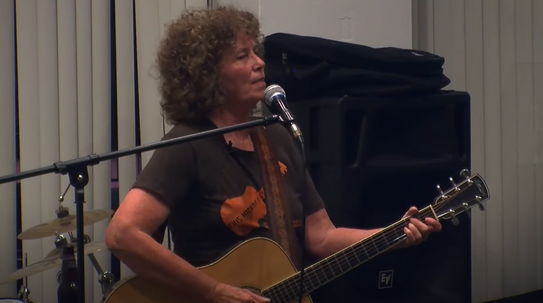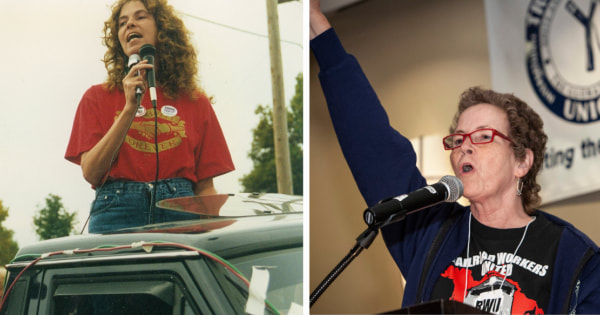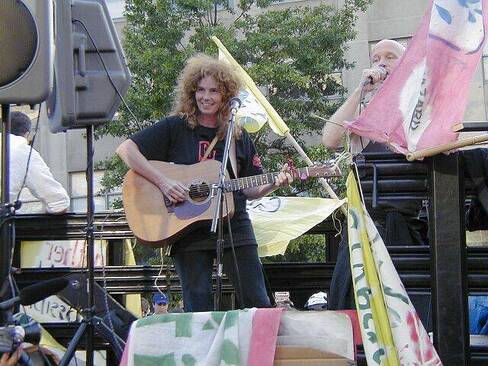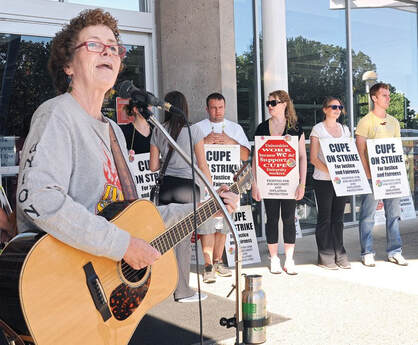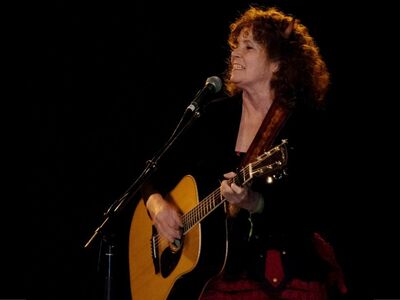|
Over the weekend, friends, family and fans of Anne Feeney gathered virtually to remember the fierce and unflagging protest singer who promised to "comfort the afflicted and afflict the comfortable." Utah Phillips called her “the best labor singer in North America." She was that, and so much more. Two-time cancer survivor Anne Feeney fell to the coronavirus in February at age 69. Saturday, her life and legacy will be celebrated virtually on Zoom and Facebook Live. I got to meet Anne several times in her hometown of Pittsburgh, PA, when I traveled there to promote Fannie Never Flinched. She wrote a ballad about Fannie Sellins' life long before I wrote my book. She Called Herself a HellraiserAnne Feeney was much, much, more. At Anne's memorial Saturday, her daughter's words are those that most deeply touched me . "My mama, Anne Feeney may not have taught me how to paint my nails or curl my hair, but she certainly taught me how to be a strong woman. She taught me to be sure I am treated equally and to treat others the same. "She taught me to protect and encourage other women. She taught me to stand together with those who are struggling. She taught me that if one person is being treated unfairly, we are all being treated unfairly." ~Amy Sue Berlin Anne's music carried a message of solidarity to working people, and put corporations and politicians on notice. She sang for steelworkers, carwash employees, miners, strawberry pickers, railroad crews, anti-sweatshop activists and homeowners fighting foreclosure. She sang at demonstrations for women's rights, the environment, human rights and lent her voice and a hand to people working to end poverty and racism. In her nearly 35-year career, Anne played and sang upwards of 4,000 shows across 40 states, Canada and Europe and recorded twelve records. She hit political protests, union halls and state fairs. Her favorite? “I love going to picket lines.” Her first public performance as a folksinger at a 1969 demonstration against the Vietnam War. Over the years, she rallied workers in big national strikes and lockouts, several which lasted more than five years. Anne joined some of the largest protests in recent history, including the 1999 shut down of the WTO in Seattle, and the March for Women’s Lives in 2004. “She was joyous and fiery in her determination to use her music to elevate those who are most marginalized and to move toward greater justice in the land,” said Peter Yarrow of Peter, Paul and Mary. Anne Feeney's best-known song, “Have You Ever Been to Jail for Justice?” was covered by Peter, Paul and Mary and made popular on 2004 album, In These Times." Many people counted Anne as a loyal friend and were inspired by her. One said, "She stayed in touch. She asked questions about our lives and families. She shared so many stories and jokes. She was a great house guest. She was razor sharp, ornery, and she did a lot of trash talking. She called shit on the left, middle, and right. and was always probing for how we could do more." Before her music and rabble-rousing career took off, Anne worked for a decade practicing trial law focused on domestic violence cases. Feeney also founded a rape crisis program in Pittsburgh in 1974, only the second such center in the nation. Always supportive of other artists and musicians, Anne served as president of the Pittsburgh Musicians’ Union for four years. She became the first female president of any musicians local in the US, and the only woman elected to the position in Pittsburgh. "I think music is a fantastic way of empowering people and giving them strength and energy," Anne told a Pittsburgh newspaper. "I've spent a good part of my life trying to find and write music that will empower people to resist and stand up for what's right." Using the same guitar she had purchased in high school, Anne played and sang Black spirituals, rock, boogie, hip-hop, reggae and ska, the precursor to rocksteady and reggae. Irish ballads, drinking songs and rebel anthems further filled out Anne's repertoire and probably ran in her blood. Her grandfather immigrated from Ireland and helped unionize mine workers in West Virginia. Every year Anne traveled through Ireland for a month or two singing in pubs. Her New York Times obituary recalled Anne Feeney was as at home on stage in a punk club as singing in a union hall, "[She] served as a link between the protest singers of the 1960s and the younger generations that emerged around the anti-globalization and antiwar movements of the early 2000s. Her admirers included both Pete Seeger and Tom Morello of Rage Against the Machine." Anne Feeney's business card read: Performer, Producer, Hellraiser. The last time I saw Anne Feeney was 18-months ago during the weekend events of the 100th Anniversary commemoration of Fannie's death. At the memorial celebration at the site where Fannie was gunned down, Anne and the Fannie Sellins Chorus sang the song Anne wrote about Fannie's life. See a quick snippet here, or listen to the full song on Spotify. Sources:
https://www.nytimes.com/2021/02/08/obituaries/anne-feeney-dead-coronavirus.html? Anne Feeney Online Memorial Celebration - April 3, 2021 http://progressivevoices.org/performers/anne-feeney/ https://labornotes.org/blogs/2021/02/rest-power-anne-feeney-1951-2021 https://en.wikipedia.org/wiki/Anne_Feeney#Music_career Comments are closed.
|
I'm fascinated to discover little-known history, stories of people and events that provide a new perspective on why and how things happened, new voices that haven't been heard, insight into how the past brought us here today, and how it might guide us to a better future.
I also post here about my books and feature other authors and their books on compelling and important historical topics. Occasionally, I share what makes me happy, pictures of my garden, recipes I've made, events I've attended, people I've met. I'm always happy to hear from readers in the blog comments, by email or social media. Archives
September 2023
Categories
All
|
